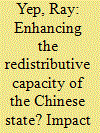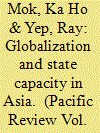|
|
|
Sort Order |
|
|
|
Items / Page
|
|
|
|
|
|
|
| Srl | Item |
| 1 |
ID:
081530


|
|
|
|
|
| Publication |
2008.
|
| Summary/Abstract |
Many observers contend that fiscal deprivation of the centre in reform China is detrimental to the overall capacity of the Chinese state, and thus the danger of national disintegration cannot be discarded. One relevant concern here is the obligation of the state to redress socio-economic dislocations, of which growing regional inequality is a major issue. The Tax Sharing Scheme introduced in 1994 represents the most colossal effort to redress the centre-local imbalance. The analysis of the patterns of income and expenditure of county finance between 1993 and 2002, however, highlights the many facets of state capacity and reiterates the possibility of state involvement amidst an improved fiscal position. The success in extractive capacity in this case does not guarantee parallel improvement in the central government's redistributive capacity. Analysis of local expenditure patterns shows that the growing support of the centre simply fails to reverse the declining level of local services in areas that may be targeted as key for poverty alleviation and equalization. The danger of the simple reading of the rise in extractive capacity attributed to the 1994 reform as a symptom of a strong central state is evident.
|
|
|
|
|
|
|
|
|
|
|
|
|
|
|
|
| 2 |
ID:
081524


|
|
|
| 3 |
ID:
081527


|
|
|
|
|
| Publication |
2008.
|
| Summary/Abstract |
This paper compares health policy trends in Indonesia, Malaysia, the Philippines and Thailand with the purpose of drawing usable lessons in reform. The study finds that governments in the region are rapidly privatizing the provision of healthcare at the same time as they are expanding the government's role in financing. The paper argues that expansion of public financing at the same time as private provision is misconceived as the combination would aggravate instances and severity of market failures peculiar to the sector. The dysfunctional trend is particularly evident in Indonesia and the Philippines. In Thailand, in contrast, the expansion of public financing has occurred in the context of a health system dominated by public providers, which has had the effect of restraining healthcare costs. Malaysia occupies a mid position between Indonesia and the Philippines on the one hand and Thailand on the other. All four cases underline the value of state capacity in designing optimal policies and implementing them effectively.
|
|
|
|
|
|
|
|
|
|
|
|
|
|
|
|
| 4 |
ID:
081525


|
|
|
|
|
| Publication |
2008.
|
| Summary/Abstract |
Hong Kong and Singapore are both typical administrative states with an efficient administration and a vibrant market, which had achieved rapid economic growth in the past decades. This article examines the trajectory of their state capacity, highlighting recent problems and challenges. Based on a conceptual framework that captures and links up four dimensions - namely polity, bureaucracy, economy and civil society - their commonalities and differences in response are discussed. Their experience should be of particular relevance to transitional authoritarian states in Asia such as China, which faces similar challenges to reform in the arenas of politics, administration, economics and society.
|
|
|
|
|
|
|
|
|
|
|
|
|
|
|
|
| 5 |
ID:
081529


|
|
|
|
|
| Publication |
2008.
|
| Summary/Abstract |
This paper considers China's state capacity and changing governance as revealed through its policies to tackle unemployment. Despite high levels of growth, economic restructuring has resulted in rising unemployment over the last decade. The Chinese state has been able to manage job losses from state enterprises, demonstrating some state capacity in relation to this sector and some persistent command economy governance mechanisms. However both design and implementation of policies to compensate and assist particular groups among the unemployed have been shaped by weak state capacity in several other areas. First, capacity to gather accurate employment data is limited, meaning local and central governments do not have a good understanding of the extent and nature of unemployment. Second, the sustainability of supposedly mandatory unemployment insurance schemes is threatened by poor capacity to enforce participation. Third, poor central state capacity to ensure local governments implement policies effectively leads to poor unemployment insurance fund capacity, resulting in provision for only a narrow segment of the unemployed and low quality employment services. Although the adoption of unemployment insurance (and its extension to employers and employees in the private sector), the introduction of a Labour Contract Law in 2007, and the delivery of employment services by private businesses indicate a shift towards the use of new governance mechanisms based on entitlement, contract and private sector delivery of public-sector goods, that shift is undermined by poor state capacity in relation to some of these new mechanisms
|
|
|
|
|
|
|
|
|
|
|
|
|
|
|
|
| 6 |
ID:
081528


|
|
|
|
|
| Publication |
2008.
|
| Summary/Abstract |
Vietnam has emerged recently as one of the fastest growing economies and widely be perceived as the next transition tiger. State capacity, which is believed to be pivotal to the success of the NIC, is under scrutiny in Vietnam. This paper attempts to examine state capacity of Vietnam in the institutional, political, administrative and technical aspects employing examples in urban and housing development. This paper argues that despite the permeation of state machinery into every levels of society and creates an outlook of a strong socialist party state, state capacity in Vietnam is in fact rather weak. Although the country is striving hard in strengthen its capacity in various areas, such reforms are either yet to take root or being dragged by legacy of the old regime. The unique state-society relationship in Vietnam also shapes the trajectories of adaptation of state capacity in the course of rapidly changing economic and social environment
|
|
|
|
|
|
|
|
|
|
|
|
|
|
|
|
| 7 |
ID:
081526


|
|
|
|
|
| Publication |
2008.
|
| Summary/Abstract |
Under intensified pressures for improving the global competence of university graduates, national governments across different parts of the globe have to on the one hand expand higher education enrolments and on the other hand assure high quality in teaching and research in order to make sure their higher education systems can compete globally. Many Asian states have been in the forefront of this effort to improve national competitiveness by raising their higher education enrolment rate. As state financing and provision alone will not satisfy the growing demands for higher education, governments in Asia adopt more pro-competition policy instruments and increasingly look to the market/private sectors in running higher education. Therefore the private higher education sector has paid for much of the higher education sector expansion, leading to revolutionary changes and imparting a growing 'privateness' to Asian higher education systems. This article sets out in this wider socio-economic context to examine the rise of transnational higher education in three Asian societies: Hong Kong, Singapore and Malaysia. With particular reference to examining how the growing prominence of privateness in higher education has challenged the conventional education governance models, this article critically examines how these Asian states have reinvented their regulatory regimes to govern the growing complexity and highly contested public-private mix in higher education
|
|
|
|
|
|
|
|
|
|
|
|
|
|
|
|
|
|
|
|
|